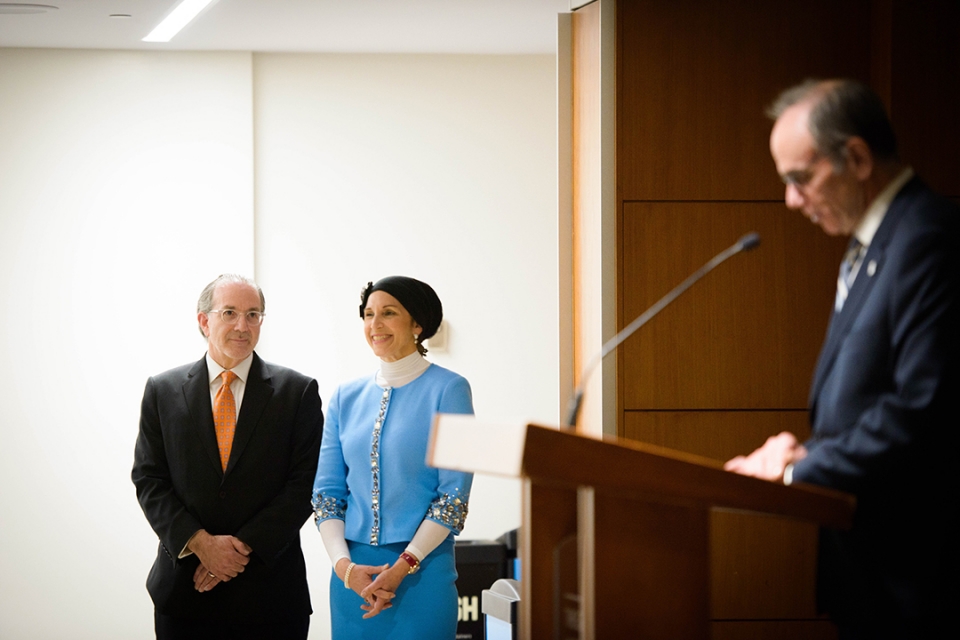“We must strategically plan our future with great wisdom, foresight and sensitivity to the complexity of our times,” said Louis Mayberg, B.B.A. ’83, “We feel an increasing distance between today’s Jewish people and the ancient wisdom that has guided our future for thousands of years.”
These words provide the guiding inspiration for the Mayberg Center for Jewish Education and Leadership, a gift from the Mayberg Foundation. The center officially opened during a dinner and reception on March 15. Mr. Mayberg said he envisions the Mayberg Center helping the next generation face a very different landscape than the one his parents and grandparents encountered. Mr. Mayberg was a business student at George Washington University 37 years ago, which led to a successful career in finance, banking and investment.
The Mayberg Center will be housed at the GW Graduate School of Education and Human Development and will provide graduate degrees in formal Jewish education, partner with Jewish non-profits locally and nationally to provide leadership development opportunities and provide a convening platform for academics and practitioners to have critical conversations on contemporary Jewish issues.
Manette Mayberg said GW is a partner that can innovate and stimulate change. “We believe education is the most important component of our investments toward sustaining future generations of engaged families and communities,” she said.
In acknowledging the gift from the Mayberg Foundation, GSEHD Dean Michael Feuer said their philanthropy “is foundational to the American experiment and. . . deeply reaffirming of the innate goodness of the American people.”
George Washington President Steven Knapp said the Mayberg Center aligns with the mission of the university and expounded on President George Washington’s vision of religious freedom that he said was based on a letter of gratitude received from the rabbi of the Jewish congregation in Rhode Island that spoke of “a government which to bigotry gives no sanction, to persecution no assistance.”
In announcing his own vision of religious freedom, Dr. Knapp said that the university’s namesake “was indeed responding to a vision of religious freedom provided to him by one of the first Jewish communities in the United States. Think about that heritage and what that means.”
He described the center as carrying on that tradition. It will be a place, he said, where learning from Jewish and other texts will be informed by the wisdom of the Jewish communal practice and enable new collaborations with many other initiatives in GSEHD and other units of the university that connect teaching, learning and community engagement, including the Columbian College Judaic Studies Program and the Gelman Library.
The dinner and reception in the City View Room served as the official launch of the Mayberg Center. Among those in attendance were Madeleine S. Jacobs, B.S. ’68 , HON ’03, and a member of the GW Board of Trustees; Deborah Ratner-Salzburg, a former GW trustee; David Gregory, former moderator of NBC’s “Meet the Press”; and Fred Lawrence, former dean of the GW Law School.
[video:https://www.youtube.com/watch?v=FpvKFcpKvKM&feature=youtu.be width:560 height:315 align:center lightbox_title:Establishment of the Mayberg Center Panel Discussion]
The dinner followed a daylong conference, bringing together Jewish leaders, educators and academics from across the country on the subject of re-imagining Jewish leadership education led by Erica Brown, an internationally renowned educator who is the the new director of the Mayberg Center and an associate professor at GSHED.
After dinner, Dr. Brown moderated a conversation between New York Times columnist David Brooks and the Isaiah Berlin Senior Fellow at the Brookings Institution Leon Wieseltier, the former literary editor for the New Republic magazine on education, leadership and integrity.The panelist also discussed what kind of school and educational trajectory each would create that had as one of its chief aims the stregthening of character.
Mr. Wieseltier said it was important to expose young Jews to the richness of their tradition, “how humanly primary it is…but not because one is a Jew. “That is just one reason. It is because it is one of the greatest human stories ever told,” he said. Mr. Brooks said he is concerned about solidarity and the loss of connectedness and the decreasing sense of community across America. The philosophies as a society we have chosen to follow have often been counter to the kind of universe that is compassionate, accountable and just. “We are too individualistic when we should be more communitarian,” he said. “We’ve been too utilitarian when we should have been more moralistic.”


